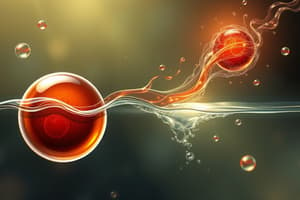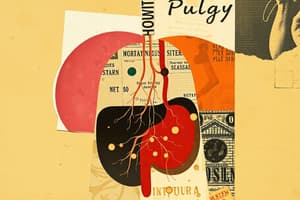Podcast
Questions and Answers
What is the primary function of homeostasis in the body?
What is the primary function of homeostasis in the body?
- To maintain equilibrium in the internal environment (correct)
- To regulate the growth and development of cells
- To enable communication between body systems
- To facilitate movement and respiration
Which type of fluid surrounds body cells and is crucial for their survival?
Which type of fluid surrounds body cells and is crucial for their survival?
- Extracellular fluid (correct)
- Tissue fluid
- Intracellular fluid
- Peripheral fluid
What occurs when homeostasis is disrupted?
What occurs when homeostasis is disrupted?
- Improved immune response
- Enhancement of cellular functions
- Increased energy levels
- Development of disease or disorder (correct)
What is a key characteristic of the anatomical position?
What is a key characteristic of the anatomical position?
Which feedback mechanism is typically involved in maintaining homeostasis?
Which feedback mechanism is typically involved in maintaining homeostasis?
What are signs and symptoms in the context of disease?
What are signs and symptoms in the context of disease?
In the context of anatomical terminology, what does 'regional names' refer to?
In the context of anatomical terminology, what does 'regional names' refer to?
What is the focus of epidemiology in health science?
What is the focus of epidemiology in health science?
What is the primary focus of anatomy?
What is the primary focus of anatomy?
Which of the following processes is NOT considered a basic life process in humans?
Which of the following processes is NOT considered a basic life process in humans?
What does the concept of homeostasis refer to?
What does the concept of homeostasis refer to?
Which of the following techniques is used for non-invasive assessment of body function?
Which of the following techniques is used for non-invasive assessment of body function?
In the organization of the human body, which level comes immediately after cells?
In the organization of the human body, which level comes immediately after cells?
What is the purpose of an autopsy?
What is the purpose of an autopsy?
Which of the following best describes the relationship between anatomy and physiology?
Which of the following best describes the relationship between anatomy and physiology?
Which of the following is a shared property of all living things?
Which of the following is a shared property of all living things?
What is the primary purpose of medical imaging procedures?
What is the primary purpose of medical imaging procedures?
In terms of structural organization, which of the following is the correct order from simplest to most complex?
In terms of structural organization, which of the following is the correct order from simplest to most complex?
Which body system is primarily responsible for maintaining homeostasis?
Which body system is primarily responsible for maintaining homeostasis?
What term refers to the study of the structure of body parts and their relationships to one another?
What term refers to the study of the structure of body parts and their relationships to one another?
Which clinical technique is commonly used to visualize internal structures of the body?
Which clinical technique is commonly used to visualize internal structures of the body?
Flashcards are hidden until you start studying
Study Notes
Homeostasis
- Homeostasis refers to the equilibrium or balance in the body’s internal environment.
- Regulatory processes are essential for maintaining homeostasis.
Body Fluids and Cellular Environment
- The survival of body cells relies on the precise regulation of their surrounding fluid, known as extracellular fluid.
Control of Homeostasis
- Homeostasis can be controlled via negative feedback mechanisms, which counteract changes to restore balance.
- Positive feedback mechanisms enhance changes, often leading to a specific outcome rather than maintaining balance.
Homeostatic Imbalances
- Disruptions in homeostasis can lead to diseases, disorders, and potentially death.
- Symptoms of imbalance are subjective changes experienced by an individual.
- Signs are objective indicators that can be observed or measured.
Epidemiology and Pharmacology
- Epidemiology studies the distribution and transmission of diseases in communities.
- Pharmacology focuses on the effects and applications of drugs in treating diseases.
Basic Anatomical Terminology
- Understanding body positions, regional names, directional terms, planes and sections, and body cavities is crucial in anatomy.
Anatomical Position
- The anatomical position is a standardized stance for observing the body: standing erect, facing forward, arms at sides with palms turned forward, and feet flat on the ground.
Anatomy vs. Physiology
- Anatomy involves the study of body structures, while physiology examines how those structures function.
Levels of Structural Organization
- The human body is organized into different levels, from cells to tissues to organs.
Clinical Connections
- Noninvasive diagnostic techniques such as palpation, auscultation, and percussion assess body structure and function.
- An autopsy is a postmortem examination that helps confirm the cause of death and diagnose anatomical abnormalities.
Basic Life Processes
- Living organisms exhibit characteristics like metabolism, responsiveness, movement, growth, differentiation, and reproduction, distinguishing them from nonliving things.
Studying That Suits You
Use AI to generate personalized quizzes and flashcards to suit your learning preferences.




